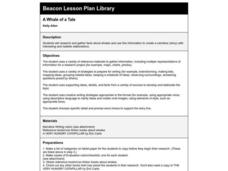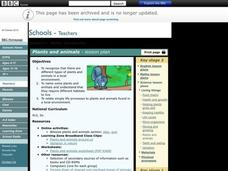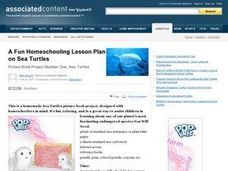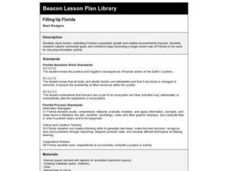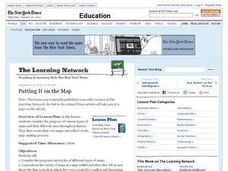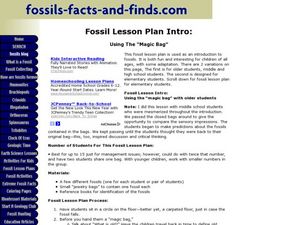Curated OER
Kingdom on Fungi
Students explore various types and characteristics of fungi. In this fungi instructional activity,students view drawings of how mushrooms grow, examine samples of fungi and complete a handout.
Curated OER
Reasons to Settle in America
Students complete a research project. In this American History instructional activity, students work in groups to research reasons that people wanted to settle in America. Students record the information, share what they found and...
Curated OER
Mapmaker, Mapmaker, Make Me a Map!
Learners evaluate the different types of historical and geographical information that one can gather through close study of historical maps from the 16th through the 19th centuries. They create their own maps.
Curated OER
English Historical Newsletter Project
Twelfth graders write a research paper on British history. They are assigned a particular decade in British history and conduct research covering several indicated topics. They reference and cite multiple resources in their research.
Curated OER
Level 3--Maintaining Employment
Students examine and define an extensive list of vocabulary words that refer to employment, including the Employee Assistance Program, as well as the keeping of a job. They complete a variety of activity sheets to assist them.
Curated OER
An Inside Look at Apples
First graders examine and identify parts of an apple. In this biology lesson, 1st graders cut an apple in half and locate all the parts, use the apple halves as stamps, and create a bar graph displaying which apple types the students...
Curated OER
Raptor Poetry
Young scholars create poems about raptors. They discuss raptors and create three poems including at least two of the following: haiku, diamante, found, and acrostic. They create a classroom book of poems or conduct a poetry slam where...
Curated OER
The Little Prince: Socratic Questioning Strategy
Challenge readers to read closer in an activity based on the Socratic questioning strategy. As kids read Antoine de Saint Éxupery's The Little Prince, they use sentence starters to ask deeper questions about the text, and to relate what...
National Wildlife Federation
Yesterday: Our Energy Needs Over Time
How has our relationship to energy changed over time? An engaging exploration challenges learners to create a timeline showing human energy needs and uses over time. Scholars review what timelines are, choose a 50-year period in history...
Curated OER
A Whale of a Tale
Students read "A Very Hungry Caterpillar" and discuss factual information in the book. They research whales and use information to write a narrative story. They take their stories through the writing process.
Curated OER
Vanished!
Students research how certain types of animals became extinct, and write report about their chosen species, explaining scientific theories or facts about how it became extinct, and how extinction has affected other species and the...
Curated OER
Bridges:Links to History
Seventh graders perform a research project based upon the study of the types of bridges. After preliminary research, student groups will search for four examples of each type located around the world.
Curated OER
Petroglyphs: Protecting the Past
Fourth graders investigate the three types of rocks and study about petroglyphs. They explore why petroglyphs were used by the Nez Perce People. Students investigate the properties of the three types of rocks and they discuss cultural...
Curated OER
Plants and Animals
Students discuss the different types of plants and animals in a local environment. In this science lesson, students name some plants and animals understanding that they require different habitats to live. Students use computers to...
Curated OER
Homeschooling Lesson: Sea Turtles
Students write down the names of common turtles and observe pictures of various types. In this sea turtles activity, students review names and features of these animals, label and draw a picture. Students research habitat, migration,...
Curated OER
Filling Up Florida
Students study factors controlling Florida's population growth and related environmental impacts. They research natural community types and construct maps (including a large-sized map of Florida) to be used for a simulation activity.
Curated OER
Shells Around the World
Students research a geographical region that contains shells. In this shells from around the world lesson, students take a field trip to a local shell shop (if possible) and then work in groups to research a geographical region such as...
Curated OER
Putting It on the Map
Young scholars consider the purpose of various types of maps and their different uses throughout history. They create their own maps and reflect on the map-making process.
Curated OER
Dictionary Details
This clever lesson has students practice finding a variety of types of information in a dictionary by playing a "Dictionary Scavenger Hunt" game. Students must use the guide words at the top of a dictionary page, determine what part of...
Curated OER
Fossil Facts and Finds- Using the Magic Bag
Students investigate fossils. In this geology instructional activity, students study various types of fossils in rocks and identify the characteristics of the fossil. Students write a research paper on their fossil.
Curated OER
Optical Illusions
Students view, identify, and construct four optical illusions. In this optical illusions lesson plan, students are introduced to four types of optical illusions. They construct their own illusions.
Curated OER
Do You Haiku? We Do!
Third graders try their hands at writing Haiku, a form of Japanese poetry. Haiku is usually 17 syllables in three-line form. This engaging lesson has many excellent worksheets and website imbedded in the plan. They share their finished...
Curated OER
Year Book Page Special Shape Collage
Students design a collage of pictures for a yearbook that make a shape. They determine the area of the shape and the price of putting the collage in the yearbook.
Curated OER
Easy to Read
Students compare reading passages in paragraph form to book form. They determine that the reading passages on the state assessments are no more difficult than the books they choose to read. They turn their favorite books into reading...











